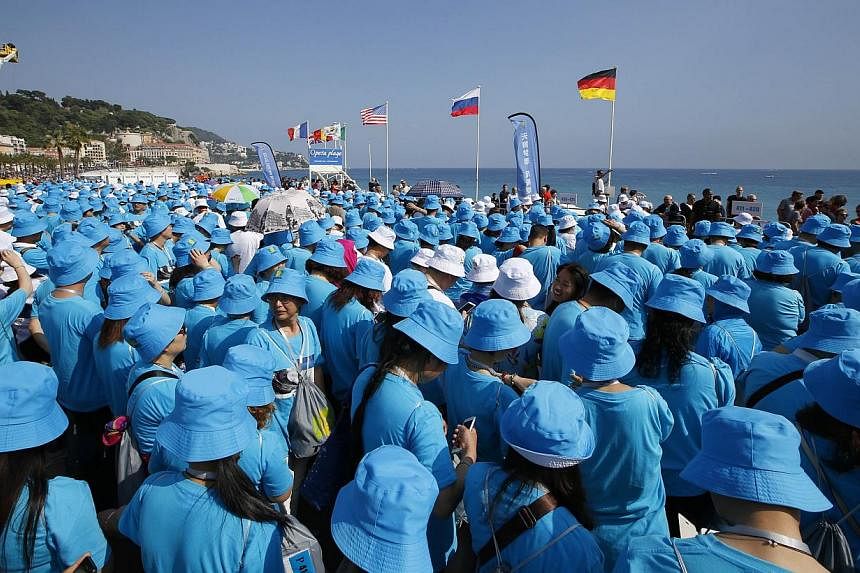As work trips go, one offered by Chinese billionaire Li Jinyuan no doubt set several records for its scale and generosity.
To celebrate the 20th anniversary of his Tiens Group, with interests ranging from biotechnology to hotels, education and financial services, Mr Li invited 6,400 of his workers, all but 1,000 of them Chinese, to visit France for four days this month.
The outing highlighted the growing popularity of France since the economic boom gave the Chinese money for travel, prompting luxury boutiques such as Chanel to employ Mandarin speakers. Often, vendors in Paris say, Chinese visitors arrive with downloaded photos on their smartphones to show what they want.
For businesses, including the 140 hotels where the Tiens employees stayed and the state SNCF railway which took them to Nice in two chartered TGV high-speed trains, the benefits were estimated at some €13 million (S$19.5 million), not counting what the visitors spent shopping, according to the daily Le Figaro.
Chinese tourists, who numbered 1.7 million in 2013, the last year for which official French statistics are available, are just the most visible part of a growing Chinese presence in France as business investment too has taken off.
Chinese money is going into interests ranging from Bordeaux vineyards to the carmaker Peugeot and even one of France's biggest airports.
According to Ms Li Chunyan, who last year founded FEIDA Consulting, which specialises in business between China and Europe, Chinese investments in France accelerated over the past year. Fosun took control of the Club Med travel company and the Jin Jiang group bought Louvre Hotels, owner of 1,200 hotels in 43 countries.
Other investments included China Huaxin's purchase of the US-French Alcatel-Lucent Enterprise telecommunications company and Dongfeng's acquisition of 14 per cent of PSA, the troubled maker of Peugeot and Citroen cars. This investment makes Dongfeng an equal partner with the French state and the Peugeot family.
One controversial investment was the purchase of 49.9 per cent of Blagnac airport in Toulouse by a consortium led by China's Symbiose and Canada's SNC-Lavalin, giving it the concession to manage the airport until 2046.
Blagnac is not only the airport of one of France's largest cities, it is also the headquarters of Airbus and the final assembly plant for most of its airliners, including the A380 super jumbo. Local politicians objected that the airport was too important strategically to fall into foreign hands, but their arguments did not prevail.
Ms Li, the author of a guide for French businessmen in China, published in French last year, asked in a recent article if the French should be worried by Chinese investment.
"China obviously still wants to learn from the West and has capital to help it do so," she wrote. "Sensible cooperation in international projects would develop the complementarity of French and Chinese talents. We must, of course, find a balance between dynamism and sharing experience to build serene relations."
If Chinese investments in French industry and infrastructure are the most lucrative, China's presence hit home in 2012 when an unnamed tycoon bought the 12th-century Chateau de Gevrey-Chambertin and accompanying vineyards producing wine of the same name.
"Our heritage is going out of the window," Mr Jean-Michel Guillon, president of the union of Gevrey-Chambertin wine producers, said at the time. "How would the Chinese feel if a French investor bought 10m or 50m of the Great Wall of China?"
That purchase followed takeovers in Bordeaux - Chinese owners are reported to now have about 100 Bordeaux vineyards. Fears that this would de-nature French traditions have so far not been justified. In many cases, the bigger vineyards had been owned by investors such as insurance companies for decades, with locals, often the original family owners, left in place to run them.
If China's investments in France seem spectacular, they are not unique. Ms Li cited the American Enterprise Institute as saying that, during the past decade, the United States attracted US$78 billion (S$103.5 billion) from China, followed by Australia with US$62.9 billion. France was in 10th place with just US$12.3 billion, behind Britain with US$27.2 billion.
She said there are signs of a slowdown in investment as growth in China dropped to 7.4 per cent last year from 17 per cent in the previous year. As well, a tough anti-graft campaign in China has hit consumption of foreign goods and tourism. In France, this has affected cognac exports, with producers reporting a 26 per cent fall in exports to China last year, according to Bloomberg News.
Often, Ms Li wrote, businessmen are hesitant because of high social charges and long administrative delays.
"Talk of a 'Chinese threat' and suspicions of industrial espionage around some ventures do not create a very warm environment," she said.

